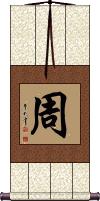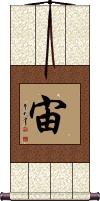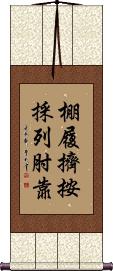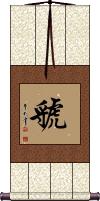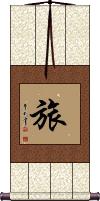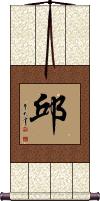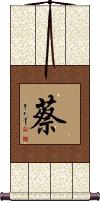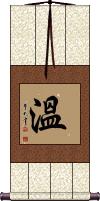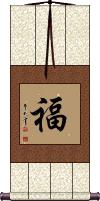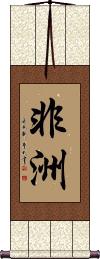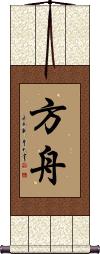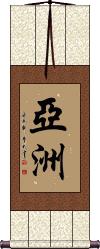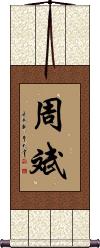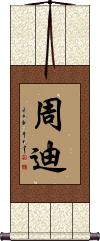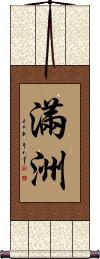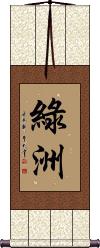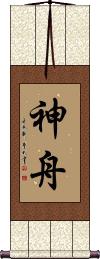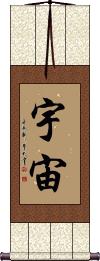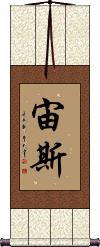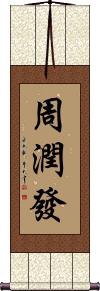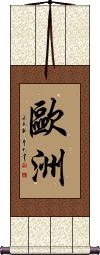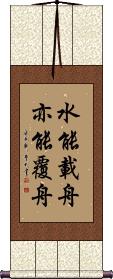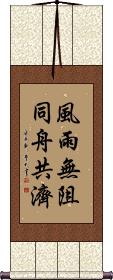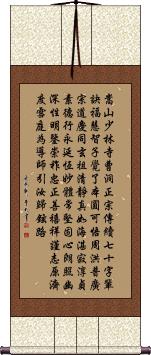Many custom options...
And formats...

Zhou in Chinese / Japanese...
Buy a Zhou calligraphy wall scroll here!
Personalize your custom “Zhou” project by clicking the button next to your favorite “Zhou” title below...
1. Zhou
3. Chow
4. Fundamental Principles of Tai Chi Chuan
5. Guo
7. Taotie
8. Chiew
9. Chau
10. Chiu
11. Tsai
12. Wen
14. Africa
15. Ark
17. Jobin
18. Jodi
19. Manchuria
20. Oasis
23. Zeus
24. Chow Yun-Fat
25. Oceania
26. Europe
27. Mark the boat to find the lost sword / Ignoring the changing circumstances of the world
28. The Universe in Balance / Balanced Universe
29. Not Only Can Water Float A Boat, It Can Sink It Also
30. Regardless of the Weather, We Overcome Troubles Together
Zhou
Surname
周 originally represents the Zhou Dynasty (1046-256 BC) of ancient China.
It has become a surname in China that romanizes as Zhou from Mandarin, Chou in Taiwan, and often written as Chow from Cantonese.
The actual meaning is circle, circumference, lap, cycle, all, thorough, or perimeter. It is used in Japanese Kanji and old Korean Hanja with that meaning - though it can also be used as a name in those languages as well.
Universe / Space
宙 means universe, cosmos, or outer space in Chinese, Japanese Kanji, and old Korean Hanja.
This can also mean air or midair depending on context.
In Korean, this can mean eternity in some contexts.
In Japanese, this can also be the female given name Haruka.
Chow
Surname
周 originally represents the Zhou Dynasty (1046-256 BC) of ancient China.
It has become a surname in China that romanizes as Zhou from Mandarin, Chou in Taiwan, and often written as Chow from Cantonese.
The actual meaning is circle, circumference, lap, cycle, all, thorough, or perimeter. It is used in Japanese Kanji and old Korean Hanja with that meaning - though it can also be used as a name in those languages as well.
Fundamental Principles of Tai Chi Chuan
Peng, Lu, Ji, An, Cai, Lie, Zhou, and Kao are the eight fundamentals or forces of Tai Chi Chuan or Taiqiquan.
棚 (Peng) refers to the outward (or upward) expansion of energy.
履 (Lu) is often referred to as “rollback.” Lu is the ability to absorb, yield/deflect incoming force.
擠 (Ji) is often thought of as a “forward press.” However, it is also best described as a “squeezing out of space.”
按 (An) is a downward movement of energy, best translated as “(relaxed) sinking.”
採 (Cai or Tsai) translated as “downward pluck.” Cai is a combination of Lu and An.
列 (Lie or Lieh) is “Split” and is a combination of Peng and Ji.
肘 (Zhou) Elbowing.
靠 (Kao) Shouldering (for when the arms are bound/distance is too close to punch).
Source: https://combativecorner.wordpress.com/2015/12/03/the-8-energies-and-5-movements-of-taijiquan/
Guo
Surname
Journey / Travel
旅 is a single Chinese character, Japanese Kanji, and old Korean Hanja that means trip, travel, or journey.
In an older context, this could refer to an army brigade or a 500-man battalion from the Zhou-dynasty Chinese army.
Taotie
In ancient China, 饕餮 was a ferocious mythological animal and the fifth son of the dragon king.
饕餮 can also refer to a zoomorphic mask motif found on Shang and Zhou ritual bronzes.
As an adjective, this can mean gluttonous, sumptuous (banquet), covetousness, greed, avarice, or intense desire.
Chiew
This is the Chinese name Chiew.
This romanization can come from Hokkien, Cantonese, or other dialects. If you are not looking for 邱, several distinct Chinese family names like Zhou (周), Zhao (趙), and Qiu (丘) can be romanized as Chiew. In the previous sentence, those are Pinyin Romanizations from Mandarin.
Chau
周 is the name Chau in Chinese (Mandarin).
The last name Chau (or Châu) has diverse origins, most prominently as a Vietnamese surname meaning "pearl," linking to Chinese roots, and also as various anglicized forms of Chinese names like Zhou (周), meaning dynasty/circle, or Zhu (朱), meaning vermilion.
If you need 朱 instead of 周, please let me know when ordering.
Chiu
邱 is the most common Chinese character for a surname that romanizes as Chiu in Cantonese.
The surname Chiu (邱) is a common Chinese family name, especially prominent in Cantonese, Hokkien, and Taiwanese communities. However, this romanization can also come from several different Chinese surnames like Qiū (丘), Zhōu (周), Zhào (趙), and Jiāng (蔣), depending on original dialect and geography. Please confirm that this is the correct character before ordering.
Tsai
蔡 is the surname Tsai or Cai in Chinese (Mandarin).
Tsai is a romanization often used in Taiwan while it would be romanized as Cai in mainland China (same pronunciation).
Derived from the State of Cai (蔡) in ancient China (present-day Henan province).
Meaning: Can relate to growing, cultivating, or being capable, with ties to agriculture and governance.
Historical Roots: Traces back over 2,500 years to the Zhou Dynasty (1046–256 BCE).
溫 is a surname that can romanize as Wen in Chinese (Mandarin).
This is not the only Wen: The surname Wen (文, 温/溫, 闻/聞) is predominantly Chinese, stemming from origins like the Zhou Dynasty founder (King Wen), meaning "culture/literature" (文) or "warm" (溫), and also from "fame/listen" (聞), with various historical states and figures contributing to its diverse roots, appearing across different Chinese dialects (Man, Boon, Vun) and other cultures like Vietnamese (Văn) and Korean (Moon).
Good Luck / Good Fortune
福 is pronounced “fu” in Chinese.
The character “fu” is posted by virtually all Chinese people on the doors of their homes during the Spring Festival (closely associated with the Chinese New Year).
One tradition from the Zhou Dynasty (beginning in 256 B.C.) holds that putting a fu symbol on your front door will keep the goddess of poverty away.
福 literally means good fortune, prosperity, blessed, blessedness, happiness, and fulfillment.
You'll also see this character in Vietnam (where Chinese characters were the written form until a romanization reform) where it is pronounced Phúc - a word commonly used in Vietnamese names because of its good meaning.
See Also: Lucky
Africa
方舟 is the Chinese, Japanese, and old Korean name for an ark (as in Noah's Ark).
The literal translation is the square boat.
Asia / Asian Continent
Jobin
Jodi
Manchuria
Oasis
Shenzhou Spacecraft
神舟 is the name of the Chinese spacecraft “Shenzhou.” The name means “divine craft” or “saintly vessel.”
The name is a play on words in Chinese, as there is an alternate name for China that is pronounced “Shenzhou” but means “Divine land” or “Land of the Gods” (just the second character is different).
The first flight of a Shenzhou spacecraft was in 1999, with more missions following. The next is planned for 2008, and will include China's first “spacewalk.” The tenth Shenzhou mission is planned for 2015, when China has promised its people that a Chinese astronaut will walk on the moon (or at least orbit the moon - there are two ways to interpret the announcement made in 2005).
For those of you concerned, this word is pronounced more like “Shen Joe” (with a slightly soft “J”) than the Romanization would suggest.
2016 Update: I wrote the above in 2006. Imagine that, 10 years later, none of the promises came true.
Universe / Cosmos
宇宙 is a Chinese, Japanese Kanji, and old Korean Hanja word that means universe, cosmos, and space.
This can also be a given name, Hiroshi, in Japanese.
Zeus
Chow Yun-Fat
Oceania
Europe
This is the Chinese name for the continent of Europe.
 Please note that Japanese use an alternate/simplified version of the first character and an alternate form of the second character. Click on the characters to the right if you want the Japanese/Simplified version of this two-character Europe calligraphy.
Please note that Japanese use an alternate/simplified version of the first character and an alternate form of the second character. Click on the characters to the right if you want the Japanese/Simplified version of this two-character Europe calligraphy.
Mark the boat to find the lost sword / Ignoring the changing circumstances of the world
刻舟求劍 is an originally-Chinese proverb that serves as a warning to people that things are always in a state of change.
Thus, you must consider that and not depend on the old ways or a way that may have worked in the past but is no longer valid.
This idiom/proverb comes from the following story:
A man was traveling in a ferry boat across a river. With him, he carried a treasured sword. Along the way, the man became overwhelmed and intoxicated by the beautiful view and accidentally dropped his prized sword into the river. Thinking quickly, he pulled out a knife and marked on the rail of the boat where exactly he had lost his sword.
When the boat arrived on the other side of the river, the man jumped out of the boat and searched for his sword right under where he'd made the mark. Of course, the boat had moved a great distance since he made the mark, and thus, he could not find the sword.
While this man may seem foolhardy, we must take a great lesson from this parable: Circumstances change, so one should use methods to handle the change. In modern China, this is used in business to mean that one should not depend on old business models for a changing market.
This proverb dates back to the Spring and Autumn period (770–476 BC) of the territory now known as China. It has spread and is somewhat known in Japan and Korea.
The Universe in Balance / Balanced Universe
宇宙平衡 is a proverb that is simply Universe Balanced (we might say “Balanced Universe” in English).
The first two characters mean the Universe. However, in some contexts, it can mean cosmic, cosmos, or outer space.
The second two characters mean balance or balanced (can also mean equilibrium).
Not Only Can Water Float A Boat, It Can Sink It Also
Many things have opposite properties. The water you drink can also drown you. Pork may nourish you and keep you alive but under-cook it and it could kill you. Potassium nitrate is often used as a fertilizer to grow the food that sustains us but it's also been used as an explosive to topple buildings and destroy us.
This concept is easily associated with “yin yang” where an element has two opposite properties that are as different as night and day.
This proverb's meaning can be summed up this way: “Anything that can lead you to success may also contain great risks.”
This phrase is known in literary circles by Korean people (scholars or literature). It is therefore also a valid proverb in Korean Hanja, though most Koreans would not be able to make sense of it.
Please note that there is an unwritten rule when the same character appears twice in the same phrase, the calligrapher will alter the appearance so that no two characters are exactly alike in the same piece. This calligraphy has two repeating characters that will be written differently than they appear here.
Regardless of the Weather, We Overcome Troubles Together
The first four characters are often translated as “Go ahead as planned regardless of the weather” or, “[Overcome] despite the rain and wind.” The last four characters can mean “Stick together” but literally means “Take the same boat [together].”
風雨無阻同舟共濟 is a Chinese proverb that suggests that you are willing (or should be willing) to overcome any adversity, and accomplish your task at hand. The second part (last four characters) is sometimes left off but this second part strongly suggests that you should overcome that adversity together.
Shaolin Generational Poem
This is a poem, including a title, that celebrates the tactics and virtues of the Shaolin Kung Fu Monks for future generations.
Not the results for zhou that you were looking for?
Below are some entries from our dictionary that may match your zhou search...
| Characters If shown, 2nd row is Simp. Chinese |
Pronunciation Romanization |
Simple Dictionary Definition |
周 see styles |
zhōu zhou1 chou meguru めぐる |
More info & calligraphy: Zhou(counter) (1) counter for laps or circuits; (2) {math} perimeter; (3) (hist) Zhou dynasty (of China; approx. 1046-256 BCE); Chou dynasty; (female given name) Meguru Around, on every side, complete. |
宙 see styles |
zhòu zhou4 chou hiroshi ひろし |
More info & calligraphy: Universe / Space(1) space; air; midair; (2) (See 空・そら・5) (from) memory; (by) heart; (male given name) Hiroshi |
亞洲 亚洲 see styles |
yà zhōu ya4 zhou1 ya chou |
More info & calligraphy: Asia / Asian Continent |
宇宙 see styles |
yǔ zhòu yu3 zhou4 yü chou uchuu / uchu うちゅう |
More info & calligraphy: Universe / Cosmosuniverse; cosmos; space; (given name) Hiroshi universe |
宙斯 see styles |
zhòu sī zhou4 si1 chou ssu |
More info & calligraphy: Zeus |
方舟 see styles |
fāng zhōu fang1 zhou1 fang chou houshuu / hoshu ほうしゅう |
More info & calligraphy: Arkark (i.e. Noah's); (given name) Houshuu |
歐洲 欧洲 see styles |
ōu zhōu ou1 zhou1 ou chou |
More info & calligraphy: EuropeSee: 欧洲 |
滿洲 满洲 see styles |
mǎn zhōu man3 zhou1 man chou |
More info & calligraphy: Manchuria |
神舟 see styles |
shén zhōu shen2 zhou1 shen chou shenchou / shencho シェンチョウ |
More info & calligraphy: Shenzhou Spacecraft(obj) Shenzhou (spacecraft) |
綠洲 绿洲 see styles |
lǜ zhōu lu:4 zhou1 lü chou |
More info & calligraphy: Oasis |
非洲 see styles |
fēi zhōu fei1 zhou1 fei chou |
More info & calligraphy: Africa |
周潤發 周润发 see styles |
zhōu rùn fā zhou1 run4 fa1 chou jun fa chouyunfa / choyunfa チョウユンファ |
More info & calligraphy: Chow Yun-Fat(person) Chow Yun-fat (1955.5.18-; Hong Kong actor) |
大洋洲 see styles |
dà yáng zhōu da4 yang2 zhou1 ta yang chou |
More info & calligraphy: Oceania |
侜 see styles |
zhōu zhou1 chou |
to conceal; to cover |
冑 see styles |
zhòu zhou4 chou kabuto かぶと |
variant of 胄[zhou4] helmet (of armor, armour); headpiece |
呪 咒 see styles |
zhòu zhou4 chou ju じゅ |
variant of 咒[zhou4] (1) spell; curse; (2) (Buddhist term) dharani; mantra; (archaism) spell; curse (Skt. mantra) |
咒 see styles |
zhòu zhou4 chou ju じゅ |
incantation; magic spell; curse; malediction; to revile; to put a curse on sb (1) spell; curse; (2) (Buddhist term) dharani; mantra dhāraṇī 陀羅尼; mantra; an incantation, spell, oath, curse; also a vow with penalties for failure. Mystical, or magical, formulae employed in Yoga. In Lamaism they consist of sets of Tibetan words connected with Sanskrit syllables. In a wider sense dhāraṇī is a treatise with mystical meaning, or explaining it. |
咮 see styles |
zhòu zhou4 chou |
beak of bird; peck at |
啁 see styles |
zhōu zhou1 chou |
twittering of birds |
喌 see styles |
zhōu zhou1 chou |
syllable |
妯 see styles |
zhóu zhou2 chou |
used in 妯娌[zhou2 li5] |
婤 see styles |
zhōu zhou1 chou |
(feminine name) |
州 see styles |
zhōu zhou1 chou toushuu / toshu とうしゅう |
prefecture; (old) province; (old) administrative division; state (e.g. of US); oblast (Russia); canton (Switzerland) sandbank; sandbar; (n,n-suf) (1) state; province; county; oblast; department (of ancient China); (2) continent; (suffix) (3) (archaism) dear; (given name) Toushuu a region |
帚 see styles |
zhǒu zhou3 chou houki / hoki ほうき |
broom (noun/participle) (kana only) broom |
怞 see styles |
zhòu zhou4 chou |
to grieve; sorrowful |
晝 昼 see styles |
zhòu zhou4 chou chū ひる |
daytime (out-dated kanji) (n-adv,n-t) (1) noon; midday; (2) daytime; (3) lunch Day, daytime, daylight. |
洲 see styles |
zhōu zhou1 chou suzaki すざき |
continent; island in a river (archaism) mid-ocean sandbank; (surname) Suzaki An islet; a continent. |
甃 see styles |
zhòu zhou4 chou |
brickwork of well |
皺 皱 see styles |
zhòu zhou4 chou shibo; sabi しぼ; さび |
to wrinkle; wrinkled; to crease (1) (See 烏帽子) bumpy texture of a material (esp. woven fabric); (2) creases in an eboshi hat wrinkles |
盩 see styles |
zhōu zhou1 chou |
name of a district in Shaanxi |
Click here for more zhou results from our dictionary
The following table may be helpful for those studying Chinese or Japanese...
| Title | Characters | Romaji (Romanized Japanese) | Various forms of Romanized Chinese | |
| Zhou | 周 | shuu / shu | zhōu / zhou1 / zhou | chou |
| Universe Space | 宙 | chuu / haruka chu / haruka | zhòu / zhou4 / zhou | chou |
| Chow | 周 | shuu / shu | zhōu / zhou1 / zhou | chou |
| Fundamental Principles of Tai Chi Chuan | 棚履擠按採列肘靠 棚履挤按采列肘靠 | péng lǚ jǐ àn cǎi liè zhǒu kào peng2 lv3 ji3 an4 cai3 lie4 zhou3 kao4 peng lv ji an cai lie zhou kao penglvjiancailiezhoukao | p`eng lü chi an ts`ai lieh chou k`ao peng lü chi an tsai lieh chou kao |
|
| Guo | 虢 | guó / guo2 / guo | kuo | |
| Journey Travel | 旅 | ryo / tabi | lǚ / lu:3 / lu: | lü |
| Taotie | 饕餮 | tou tetsu / toutetsu / to tetsu | tāo tiè / tao1 tie4 / tao tie / taotie | t`ao t`ieh / taotieh / tao tieh |
| Chiew | 邱 | qiū / qiu1 / qiu | ch`iu / chiu | |
| Chau | 周 | zhōu / zhou1 / zhou | chou | |
| Chiu | 邱 | qiū / qiu1 / qiu | ch`iu / chiu | |
| Tsai | 蔡 | cài / cai4 / cai | ts`ai / tsai | |
| Wen | 溫 温 | wēn / wen1 / wen | ||
| Good Luck Good Fortune | 福 | fuku | fú / fu2 / fu | |
| Africa | 非洲 | fēi zhōu / fei1 zhou1 / fei zhou / feizhou | fei chou / feichou | |
| Ark | 方舟 | hakobune | fāng zhōu fang1 zhou1 fang zhou fangzhou | fang chou fangchou |
| Asia Asian Continent | 亞洲 亚洲 | yà zhōu / ya4 zhou1 / ya zhou / yazhou | ya chou / yachou | |
| Jobin | 周斌 | zhōu bīn / zhou1 bin1 / zhou bin / zhoubin | chou pin / choupin | |
| Jodi | 周迪 | zhōu dí / zhou1 di2 / zhou di / zhoudi | chou ti / chouti | |
| Manchuria | 滿洲 满洲 | mǎn zhōu / man3 zhou1 / man zhou / manzhou | man chou / manchou | |
| Oasis | 綠洲 绿洲 | lǜ zhōu / lv4 zhou1 / lv zhou / lvzhou | lü chou / lüchou | |
| Shenzhou Spacecraft | 神舟 | shén zhōu shen2 zhou1 shen zhou shenzhou | shen chou shenchou |
|
| Universe Cosmos | 宇宙 | uchuu / uchu | yǔ zhòu / yu3 zhou4 / yu zhou / yuzhou | yü chou / yüchou |
| Zeus | 宙斯 | zhòu sī / zhou4 si1 / zhou si / zhousi | chou ssu / choussu | |
| Chow Yun-Fat | 周潤發 周润发 | zhōu rùn fā zhou1 run4 fa1 zhou run fa zhourunfa | chou jun fa choujunfa |
|
| Oceania | 大洋洲 | dà yáng zhōu da4 yang2 zhou1 da yang zhou dayangzhou | ta yang chou tayangchou |
|
| Europe | 歐洲 欧洲 / 欧州 | ou shuu / oushuu / o shu | ōu zhōu / ou1 zhou1 / ou zhou / ouzhou | ou chou / ouchou |
| Mark the boat to find the lost sword Ignoring the changing circumstances of the world | 刻舟求劍 刻舟求剑 | kokushuukyuuken kokushukyuken | kè zhōu qiú jiàn ke4 zhou1 qiu2 jian4 ke zhou qiu jian kezhouqiujian | k`o chou ch`iu chien kochouchiuchien ko chou chiu chien |
| The Universe in Balance Balanced Universe | 宇宙平衡 | u chuu hei kou uchuuheikou u chu hei ko | yǔ zhòu píng héng yu3 zhou4 ping2 heng2 yu zhou ping heng yuzhoupingheng | yü chou p`ing heng yüchoupingheng yü chou ping heng |
| Not Only Can Water Float A Boat, It Can Sink It Also | 水能載舟亦能覆舟 水能载舟亦能覆舟 | shuǐ néng zài zhōu yì néng fù zhōu shui3 neng2 zai4 zhou1 yi4 neng2 fu4 zhou1 shui neng zai zhou yi neng fu zhou | shui neng tsai chou i neng fu chou | |
| Regardless of the Weather, We Overcome Troubles Together | 風雨無阻同舟共濟 风雨无阻同舟共济 | fēng yǔ wú zǔ tóng zhōu gòng jì feng1 yu3 wu2 zu3 tong2 zhou1 gong4 ji4 feng yu wu zu tong zhou gong ji fengyuwuzutongzhougongji | feng yü wu tsu t`ung chou kung chi feng yü wu tsu tung chou kung chi |
|
| Shaolin Generational Poem | 嵩山少林寺曹洞正宗傳續七十字輩訣福慧智子覺了本圓可悟周洪普廣宗道慶同玄祖清靜真如海湛寂淳貞素德行永延恆妙體常堅固心朗照幽深性明鑒崇祚忠正善禧祥謹志原濟度雪庭為導師引汝歸鉉路 嵩山少林寺曹洞正宗传续七十字辈诀福慧智子觉了本圆可悟周洪普广宗道庆同玄祖清静真如海湛寂淳贞素德行永延恒妙体常坚固心朗照幽深性明鉴崇祚忠正善禧祥谨志原济度雪庭为导师引汝归铉路 | sōng shān shào lín sì cáo dòng zhèng zōng chuán xù qī shí zì bèi jué fú huì zhì zǐ jiào le běn yuán kě wù zhōu hóng pǔ guǎng zōng dào qìng tóng xuán zǔ qīng jìng zhēn rú hǎi zhàn jì chún zhēn sù dé xíng yong song1 shan1 shao4 lin2 si4 cao2 dong4 zheng4 zong1 chuan2 xu4 qi1 shi2 zi4 bei4 jue2 fu2 hui4 zhi4 zi3 jiao4 le5 ben3 yuan2 ke3 wu4 zhou1 hong2 pu3 guang3 zong1 dao4 qing4 tong2 xuan2 zu3 qing1 jing4 zhen1 ru2 hai3 zhan4 ji4 chun2 zhen1 su4 de2 xing2 yong song shan shao lin si cao dong zheng zong chuan xu qi shi zi bei jue fu hui zhi zi jiao le ben yuan ke wu zhou hong pu guang zong dao qing tong xuan zu qing jing zhen ru hai zhan ji chun zhen su de xing yong | sung shan shao lin ssu ts`ao tung cheng tsung ch`uan hsü ch`i shih tzu pei chüeh fu hui chih tzu chiao le pen yüan k`o wu chou hung p`u kuang tsung tao ch`ing t`ung hsüan tsu ch`ing ching chen ju hai chan chi ch`un chen su te hsing yung sung shan shao lin ssu tsao tung cheng tsung chuan hsü chi shih tzu pei chüeh fu hui chih tzu chiao le pen yüan ko wu chou hung pu kuang tsung tao ching tung hsüan tsu ching ching chen ju hai chan chi chun chen su te hsing yung |
|
| In some entries above you will see that characters have different versions above and below a line. In these cases, the characters above the line are Traditional Chinese, while the ones below are Simplified Chinese. | ||||
Successful Chinese Character and Japanese Kanji calligraphy searches within the last few hours...
